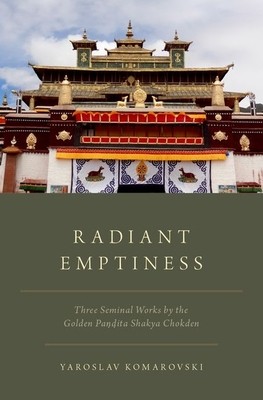
- We will send in 10–14 business days.
- Author: Yaroslav Komarovski
- Publisher: Oxford University Press, USA
- ISBN-10: 0190933836
- ISBN-13: 9780190933838
- Format: 16 x 23.6 x 4.3 cm, hardcover
- Language: English
- SAVE -10% with code: EXTRA
Reviews
Description
In Radiant Emptiness, Yaroslav Komarovski offers an annotated translation of three seminal works on the nature and relationship of the Yogacara and Madhyamaka schools of Buddhist thought, by Serdok Penchen Shakya Chokden (1428-1507). There has never been consensus on the meaning of Madhyamaka and Yogacara, and for more than fifteen centuries the question of correct identification and interpretation of these systems has remained unsolved. Chokden proposes to accept Yogacara and Madhyamaka on their own terms as compatible systems, despite their considerable divergences and reciprocal critiques. His major objective is to bring Yogacara back from obscurity, present it in a positive light, and correct its misrepresentation by earlier thinkers. He thus serves as a major resource for scholarly research on the historical and philosophical development of Yogacara and Madhyamaka. Until recently, Shakya Chokden's works have been largely unavailable. Only in 1975 were his collected writings
published in twenty-four volumes in Bhutan. Since then, his ingenious works on Buddhist history, philosophy, and logic have attracted increasing scholarly attention. Komarovski's research on Shakya Chokden's innovative writings--most of which are still available only in the original Tibetan--revises early misinterpretations by addressing some of the most complicated aspects of his thought. While focusing on his unique interpretation of Yogacara and Madhyamaka, the book also shows that his thought provides an invaluable base to challenge and expand our understanding of such topics as epistemology, contemplative practice, the relationship between intellectual study and meditative experience, and other key questions that occupy contemporary scholarship on Buddhism and religion in general.
EXTRA 10 % discount with code: EXTRA
The promotion ends in 16d.22:05:55
The discount code is valid when purchasing from 10 €. Discounts do not stack.
- Author: Yaroslav Komarovski
- Publisher: Oxford University Press, USA
- ISBN-10: 0190933836
- ISBN-13: 9780190933838
- Format: 16 x 23.6 x 4.3 cm, hardcover
- Language: English English
In Radiant Emptiness, Yaroslav Komarovski offers an annotated translation of three seminal works on the nature and relationship of the Yogacara and Madhyamaka schools of Buddhist thought, by Serdok Penchen Shakya Chokden (1428-1507). There has never been consensus on the meaning of Madhyamaka and Yogacara, and for more than fifteen centuries the question of correct identification and interpretation of these systems has remained unsolved. Chokden proposes to accept Yogacara and Madhyamaka on their own terms as compatible systems, despite their considerable divergences and reciprocal critiques. His major objective is to bring Yogacara back from obscurity, present it in a positive light, and correct its misrepresentation by earlier thinkers. He thus serves as a major resource for scholarly research on the historical and philosophical development of Yogacara and Madhyamaka. Until recently, Shakya Chokden's works have been largely unavailable. Only in 1975 were his collected writings
published in twenty-four volumes in Bhutan. Since then, his ingenious works on Buddhist history, philosophy, and logic have attracted increasing scholarly attention. Komarovski's research on Shakya Chokden's innovative writings--most of which are still available only in the original Tibetan--revises early misinterpretations by addressing some of the most complicated aspects of his thought. While focusing on his unique interpretation of Yogacara and Madhyamaka, the book also shows that his thought provides an invaluable base to challenge and expand our understanding of such topics as epistemology, contemplative practice, the relationship between intellectual study and meditative experience, and other key questions that occupy contemporary scholarship on Buddhism and religion in general.


Reviews